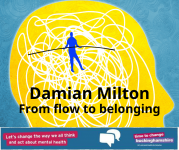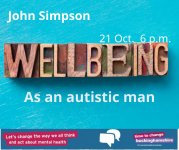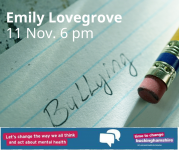We are running a series of webinars on autistic mental health and employment in sync with the World mental health days.
We have exciting speakers lined up
Emily Lovegrove - Workplace bullying
Dr Lovegrove is an Autistic Psychologist (biology, anxiety, autism, and anti-bullying strategies). Speaker, trainer, researcher, author of ‘Autism Bullying and Me’
See the video below in the thread.
Jon Adams - Autism and suicide
Damian Milton - Autistic wellbeing, from flow to belonging
Author of the Double Empathy theory of autism, Dr Damian Milton is an author, consultant, Lecturer in Intellectual and Developmental Disability at Tizard Centre, University of Kent and chair of the Participatory Autism Research Collective (PARC). Damian one of leading autistic autism researchers with an interest in autistic wellbeing.
See slides and video below in the thread.
John Simpson - My journey to wellbeing
John is an autistic man delivering inspirational training to staff, parents/carers and autistic people to change beliefs, expectations and approaches to autism spectrum conditions.
Watch the video below in the thread.
The events are of course free to attend,
Looking forward to seeing you.
What questions do you have to the speakers?
We have exciting speakers lined up
Emily Lovegrove - Workplace bullying
Dr Lovegrove is an Autistic Psychologist (biology, anxiety, autism, and anti-bullying strategies). Speaker, trainer, researcher, author of ‘Autism Bullying and Me’
See the video below in the thread.
Jon Adams - Autism and suicide
Damian Milton - Autistic wellbeing, from flow to belonging
Author of the Double Empathy theory of autism, Dr Damian Milton is an author, consultant, Lecturer in Intellectual and Developmental Disability at Tizard Centre, University of Kent and chair of the Participatory Autism Research Collective (PARC). Damian one of leading autistic autism researchers with an interest in autistic wellbeing.
See slides and video below in the thread.
John Simpson - My journey to wellbeing
John is an autistic man delivering inspirational training to staff, parents/carers and autistic people to change beliefs, expectations and approaches to autism spectrum conditions.
Watch the video below in the thread.
The events are of course free to attend,
Looking forward to seeing you.
What questions do you have to the speakers?
Attachments
Last edited:






